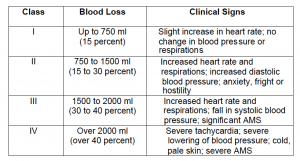Blood supplies the brain and other body parts with the oxygen and nutrients they need to live and function.
A sudden decrease in the amount of blood in the circulatory system, such as that caused by severe bleeding, endangers these tissues.
A sudden decrease in blood volume can also produce hypovolemic (low volume) shock. An average adult has about six quarts (around 5000 to 6000 milliliters) of blood in his body.
a. Blood products can not be replaced on the front line of the battlefield, so it must be stopped at all costs. The old school of thought of treating with direct pressure and then elevation and working your way to a tourniquet as a last resort is antiquated.
Modern medical research has proven that on the battlefield lives will be saved with the aggressive use of tourniquets and then attempting to reduce these to pressure dressings as the situation permits.
b. Figure 2-1 shows the effects of blood loss on the body. This guide can help you determine the amount of loss the patient has already suffered. Once the patient has reached stages lll and lV, it is often too late. This helps to demonstrate the importance of early and aggressive control of hemorrhage on the battlefield.

NOTE: Altered mental status (AMS).
